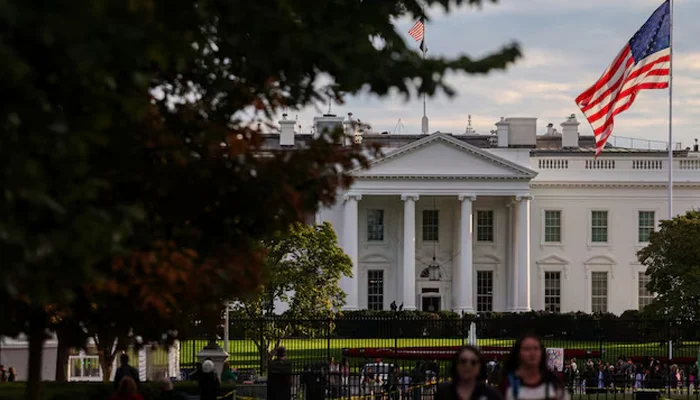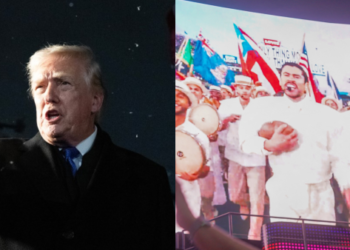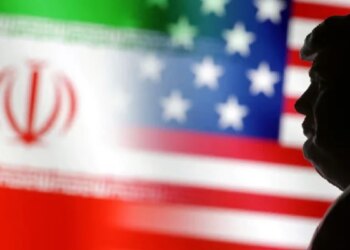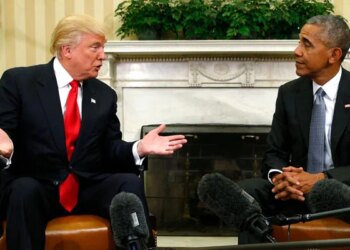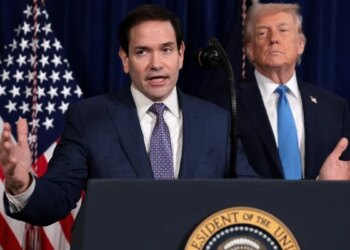Select Language:
A broad view of the White House in Washington, D.C., USA — Reuters
– Trump instructs Pentagon to begin nuclear weapons testing.
– Experts warn that explosion tests could cause significant disruptions.
– Resuming nuclear testing would undermine the long-standing testing moratorium, potentially giving adversaries like Russia and China an advantage.
During his confirmation hearing on Thursday morning, Vice Admiral Richard Correll expected a straightforward process to become the head of America’s nuclear forces. However, just before his testimony, President Donald Trump caused a stir by posting on social media, announcing he had directed the military to “start testing our Nuclear Weapons,” asserting that the U.S. must keep pace with Russia and China.
“Russia is second, and China is a distant third, but will be even within 5 years,” Trump claimed.
Throughout the roughly 90-minute Senate Armed Services Committee hearing, Correll faced repeated questions from lawmakers puzzled by Trump’s remarks, reflecting the confusion sparked across Washington and beyond.
Senator Jack Reed, the top Democrat on the committee, asked whether restarting U.S. nuclear explosive tests might destabilize the global nuclear balance and trigger a new arms race.
Correll responded that if confirmed as the commander of STRATCOM, his role would be to provide military advice regarding any testing discussions.
While the nomination for STRATCOM leadership was announced in early September, Correll answered questions cautiously during the hearing.
At one point, Senator Angus King asked if Trump’s statement might refer to testing delivery systems like missiles rather than nuclear explosive testing.
Correll admitted he did not have insight into the president’s specific intent but acknowledged that this could be a reasonable interpretation.
### U.S. Moratorium
Officials from the U.S. did not clarify whether Trump’s call was for testing nuclear delivery systems or ending a 33-year-old moratorium on nuclear explosion tests, which experts warn would be disruptive and risk escalating tensions with rivals, reminiscent of Cold War fears.
Vice President JD Vance emphasized that testing is part of maintaining the functionality of the U.S. nuclear stockpile.
The U.S. and other nuclear powers have largely halted underground detonation testing, relying instead on advanced computer simulations to ensure arsenal readiness.
Tara Drozdenko, director of the Global Security Program at the Union of Concerned Scientists, stated, “There’s no valid reason for the U.S. to resume nuclear explosive testing—it would actually make the nation less secure.”
She added, “From a strategic standpoint, resuming tests offers little gain and could jeopardize our safety.”
### Sending a Signal to Moscow and Beijing
Many analysts believe Trump’s provocative posturing aims to send a message to Russia and China. In a social media post issued before a summit with Chinese President Xi Jinping in South Korea, Trump said he had instructed the Pentagon to begin testing “on an equal basis,” claiming this process would begin immediately.
Only North Korea has conducted nuclear tests this century, with the last in 2017. Russia recently tested two new nuclear-powered weapons and has been accused of conducting low-yield tests without transparency. Moscow has warned that if any other country tests a nuclear weapon, it will too, according to a Kremlin spokesperson.
China has resisted U.S. efforts to hold nuclear arms talks, even as it seeks to rapidly expand its nuclear arsenal. Beijing has shown little interest in negotiations with Russia or the U.S., arguing that their nuclear forces remain significantly larger.
James Acton, co-director of the Nuclear Policy Program at the Carnegie Endowment for International Peace, commented, “If the goal is to pressure China into negotiations, that’s unlikely to succeed.” China expects the U.S. to honor its commitments to a testing ban and moratorium, according to Beijing’s foreign ministry.
### Potential Benefits for U.S. Adversaries
Breaking the testing moratorium could advantage Russia and China, allowing them to conduct more nuclear tests and advance their weapons programs, according to the Ploughshares Fund, an organization dedicated to reducing nuclear threats.
The U.S. has led the world in nuclear testing, conducting over 1,030 tests since 1945, and continues to maintain extensive data from that history.
STRATCOM, where Correll is currently the second-in-command, certified the U.S. nuclear arsenal as recently as January.
“Resuming testing would benefit adversaries by allowing them to catch up in nuclear research and weapon development,” the Ploughshares Fund warned.
A Department of Energy source, speaking anonymously, indicated any future test would occur deep underground at a Nevada site prepared for such activity within 36 months.
During the hearing, Senator Jacky Rosen from Nevada emphasized the state’s history with nuclear testing, from 1951 to 1992, vowing to prevent any resumption: “Let me be clear: I will not let this happen. Not on my watch.”

